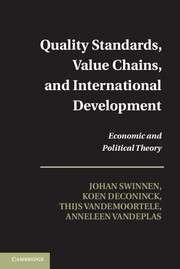Book contents
- Frontmatter
- Contents
- Preface and Acknowledgments
- 1 Introduction
- 2 Modeling Standards
- 3 Efficiency and Equity Effects of Standards
- 4 The Political Economy of Standards and Development
- 5 International Trade and Standards
- 6 Risk, Externalities, and the Nature of Standards
- 7 Endogenous Private and Public Standards in Value Chains
- 8 Butterflies and Political Economy Dynamics in Standard Setting
- 9 The Political Economy of Standards and Inclusion in Value Chains
- 10 Standards, Production Structure, and Inclusion in Value Chains
- 11 Standards, Market Imperfections, and Vertical Coordination in Value Chains
- 12 Market Power and Vertical Coordination in Value Chains
- 13 Price Transmission in Value Chains
- 14 Commodity Characteristics and Value Chain Governance
- 15 Economic Liberalization, Value Chains, and Development
- 16 Standards and Value Chains with Contracting Costs: Toward a General Model
- 17 General Equilibrium Effects of Standards in Value Chains
- References
- Index
6 - Risk, Externalities, and the Nature of Standards
Published online by Cambridge University Press: 05 August 2015
- Frontmatter
- Contents
- Preface and Acknowledgments
- 1 Introduction
- 2 Modeling Standards
- 3 Efficiency and Equity Effects of Standards
- 4 The Political Economy of Standards and Development
- 5 International Trade and Standards
- 6 Risk, Externalities, and the Nature of Standards
- 7 Endogenous Private and Public Standards in Value Chains
- 8 Butterflies and Political Economy Dynamics in Standard Setting
- 9 The Political Economy of Standards and Inclusion in Value Chains
- 10 Standards, Production Structure, and Inclusion in Value Chains
- 11 Standards, Market Imperfections, and Vertical Coordination in Value Chains
- 12 Market Power and Vertical Coordination in Value Chains
- 13 Price Transmission in Value Chains
- 14 Commodity Characteristics and Value Chain Governance
- 15 Economic Liberalization, Value Chains, and Development
- 16 Standards and Value Chains with Contracting Costs: Toward a General Model
- 17 General Equilibrium Effects of Standards in Value Chains
- References
- Index
Summary
Introduction
In Chapters 4 and 5 we derived the politically optimal level of standards and showed that the politically optimal choice of standards is affected by various factors including efficiency gains for consumers, implementation costs for producers, as well as levels of development, the media, a standard's effect on comparative advantage, and the ability of institutions to enforce standards.
An important question is whether these results are sensitive to the nature of standards. As discussed in Chapter 2, there is a variety of standards and, by consequence, a variety of ways of modeling standards. Studies in the literature have typically used a general concept of “standards” (as in our own analysis in Chapters 4 and 5) or analyzed a specific case (such as genetic modification [GM] regulations). Yet the issue whether the results depend on the nature of standards may be an important question, in particular if one considers the increasing importance of standards in trade conflicts. Some of the main conflicts in international trade policies relate to safety regulations, such as the bovine growth hormone case, the GM food case, and the (in)famous aflatoxin case. However, other types of standards, such as social and ethical standards, also affect trade. The growing influence of quality, environmental, and social standards on trade has caused Pascal Lamy, when he was Director-General of the World Trade Organization, to publicly warn that this proliferation of “green” and other standards could complicate trade negotiations (Minder, 2007). For all these reasons it is important to examine whether the nature of standards affects the political choice of the standard and how it may distort trade.
The objective of this chapter is therefore to analyze how the nature of standards affects the political economy of standards. The model in this chapter builds on the analytical framework developed in Chapters 4 and 5, but is extended to model explicitly the effects of different types of standards. An important contribution of this chapter is that it explicitly integrates risk and externalities in a political economy setting.
The chapter is organized as follows. The next section extends the model of Chapters 4 and 5 to analyze the impact of different standards on consumers – taking risk considerations into account – and producers.
- Type
- Chapter
- Information
- Quality Standards, Value Chains, and International DevelopmentEconomic and Political Theory, pp. 66 - 75Publisher: Cambridge University PressPrint publication year: 2015



